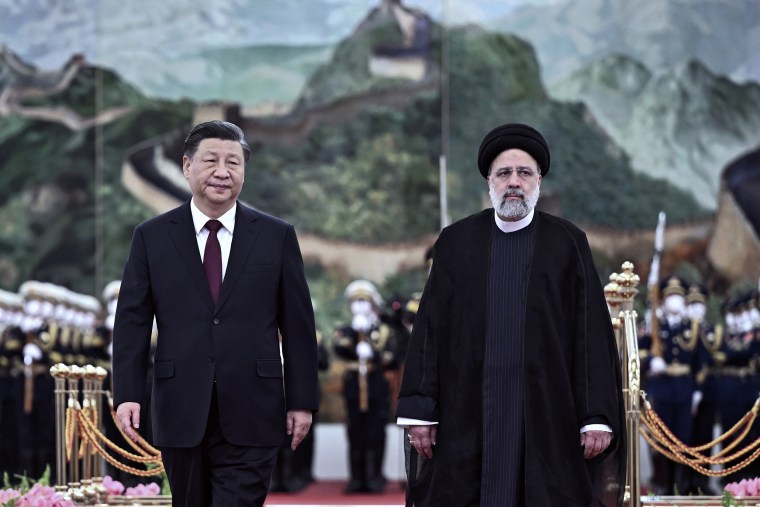The Chinese and Iranian presidents have issued a joint statement that expresses their intentions to align counter-terrorism efforts and expand bilateral cooperation in this area.
The statement, released on the last day of Iranian President Ebrahim Raisi’s three-day state visit to Beijing, revealed that two presidents agreed to promote regional and international peace and security and discuss a joint political mechanism to fight terror-related issues.
“They condemned all forms of terrorism and terrorist attacks against civilians and expressed their opposition to double standard policies in the fight against terrorism and linking the scourge to any particular religion and ethnic group”, the Iranian president’s official website quoted the statement as saying.
The statement also said that “the Iranian and Chinese presidents reaffirmed that the United States’ unilateral withdrawal from the nuclear agreement, formally known as the Joint Comprehensive Plan of Action (JCPOA), is the root cause of the current stalemate in the negotiations to revive the landmark accord”.
It’s worth noting that China is also a signatory to the nuclear deal between Iran and world powers, along with Russia, Britain, France, and Germany. The 2015 nuclear agreement (JCPOA) limited Iran's uranium enrichment program to make it harder for Tehran to develop nuclear arms, in return for lifting international sanctions.
The statement stressed the importance of removing sanctions and ensuring Iran’s economic interests as the fundamental part of the JCPOA, saying, “All relevant sanctions should be removed in a verifiable manner to facilitate the full and effective implementation of the JCPOA.”
According to the statement, the Iranian and Chinese presidents thoroughly discussed cooperation in all areas as well as regional and international developments in a friendly atmosphere and reached broad agreements, including accelerating the implementation of a strategic 25-year partnership agreement between the two countries.
Iran and China signed the comprehensive strategic partnership agreement in 2021 in defiance of unilateral sanctions against the two countries imposed by the US. The deal officially documents the Sino-Iranian Comprehensive Strategic Partnership that had been announced during a visit by the Chinese president to Tehran in 2016. It sets the outlines of cooperation in political, cultural, security, defense, regional, and international domains for the next 25 years.
In their statement, the presidents reiterated their firm support for the establishment of a Middle East free of nuclear weapons and other weapons of mass destruction, and emphasized the importance of disarmament and non-proliferation of nuclear weapons for improving international peace and reiterated their respect for the inalienable rights of all NPT member states to develop nuclear science and technology and obtain nuclear materials, technology and equipment for peaceful purposes.
According to the statement, the Chinese side strongly opposes interference of foreign forces in the internal affairs of Iran and efforts to undermine the country’s stability and security and supports Tehran’s increasing role in regional and international issues.
They agreed to accelerate the implementation of the comprehensive cooperation plan and further development of cooperation in the fields of trade, agriculture, industry, renewable energy and infrastructure.
The two sides also agreed that the 18th meeting of the Iran-China Joint Trade and Economic Committee will be held in Tehran in 2023. In addition, President Xi Jinping accepted Raisi's invitation to pay a state visit to Iran when convenient.
On February 14, the Iranian and Chinese presidents signed 20 cooperation documents and memoranda which included several areas of mutual cooperation including crisis management, tourism, communication and information technology, environment, international trade, intellectual property, agriculture, export, healthcare, media, sports and cultural heritage.
The signed documents also cover agreements in the field of transportation worth $12 billion, which include projects like the high-speed rail link between Tehran and Mashhad and investment in the Imam Khomeini Airport City. Investment in Iran's south-eastern Makran coast, and the purchase of Iranian oil are also mentioned in the documents.
Dealing with an economic crisis, Tehran is aiming to attract billions in investment and make Iran a key part of China’s Belt and Road Initiative — a multi-trillion-dollar infrastructure scheme designed to stretch from East Asia to Europe. The project, aimed at significantly expanding China’s economic and political influence, has raised concerns in the United States.
China has continued to play an important role in the Iranian economy by purchasing Iranian oil in defiance of US sanctions. This trade has been seen as a lifeline for Iran amid the pressure of sanctions, but it has been enabled by lax US enforcement and hefty Iranian discounts to persuade Chinese buyers to accept the sanctions risk.
China has remained Iran's largest trading partner for 10 consecutive years as of 2022, according to the Chinese Ministry of Commerce. China-Iran trade totaled $15.8 billion dollars in 2022, up 7% year on year.







 President Ilham Aliyev shed light on the evolving contours of the peace process with Armenia during an international conference in Baku this week. ...
President Ilham Aliyev shed light on the evolving contours of the peace process with Armenia during an international conference in Baku this week. ...
 Azerbaijan and Armenia started the process of demarcation of their border on Tuesday, with the installation of the first border markers based on ge...
Azerbaijan and Armenia started the process of demarcation of their border on Tuesday, with the installation of the first border markers based on ge...
 Armenian sappers commenced on Monday mine-clearance operations in the territories adjacent to the Saint Mary Church in village of Voskepar (Armenia...
Armenian sappers commenced on Monday mine-clearance operations in the territories adjacent to the Saint Mary Church in village of Voskepar (Armenia...
 President Aliyev emphasized the critical role of the North-South Transport Corridor in fostering transport cooperation between Azerbaijan and Russi...
President Aliyev emphasized the critical role of the North-South Transport Corridor in fostering transport cooperation between Azerbaijan and Russi...
 As the conflict between Ukraine and Russia escalates, the strategic importance of Kharkiv, Ukraine's second-largest city, has come sharply into focus.
As the conflict between Ukraine and Russia escalates, the strategic importance of Kharkiv, Ukraine's second-largest city, has come sharply into focus.



